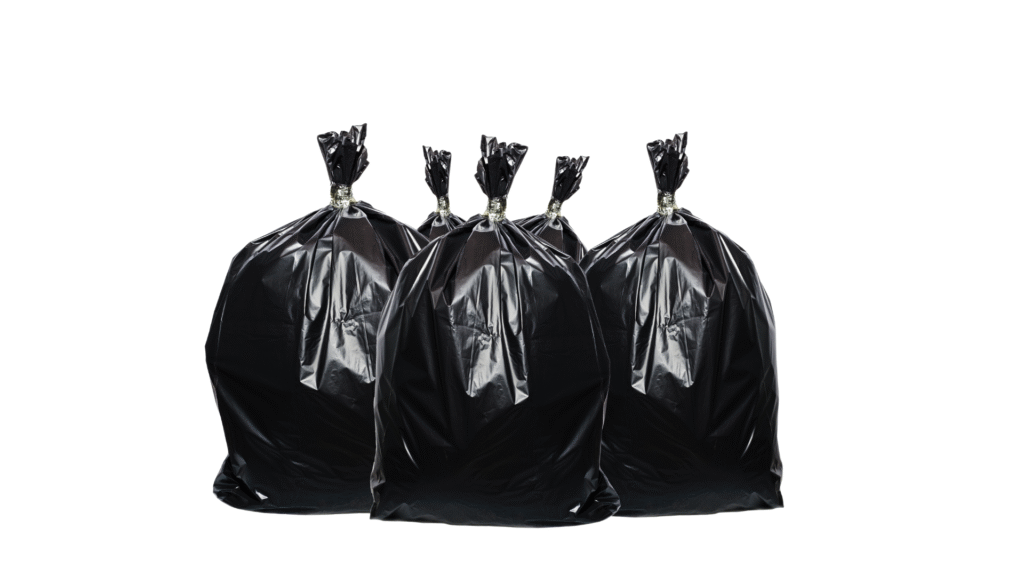Trash bags are a necessity for any organization.
These bags collect and organize the trash, keeping your facilities clean and tidy. Even if the contents (the waste) can be recycled, what about the bags themselves?
Your trash bags are also subject to recycling when they are worn out or cannot be used anymore. However, the recycling of trash bags is simply not something you toss into the bin. Rather, you should be aware of some dos and don’ts associated with the recycling of trash bags, which we have discussed in this blog.
Understanding Trash Bags and Their Materials
Let’s discuss what trash bags are constructed from before we dive into the details. Trash bags are typically made from polyethylene, which is a flexible and strong plastic.
It exists in two basic forms: low-density polyethylene (LDPE) and high-density polyethylene (HDPE). LDPE is softer and used for lighter-duty use, whereas HDPE is heavier-duty for big trash.
Why Recycle Trash Bags?
Plastic, including the type used to make most trash bags, is made from petroleum.
A large amount of energy and raw materials is invested in creating new plastic bags. With the trash bag recycling, you lower the consumption of oil and gas, conserving these resources.
Additionally, it saves the bags from getting into landfills, where they sit for hundreds of years. They pose a risk for animals who mistake plastic for food. Even worse, they are likely to break down into microplastics. These microplastics can contaminate soil and water bodies.
Therefore, sending your trash bags for recycling is an important contribution to protecting the environment.
Moreover, recycling turns waste into new resources, thereby benefiting communities. Plastic films collected at drop-off locations are turned into pellets. These pellets are used in the manufacturing of plastic lumber for park benches, decks, or additional bags. Not only does it encourage green practices, but it also creates new jobs.
Why is the Recycling of Trash Bags Tricky?
However, it is also important to be aware of the challenges of recycling trash bags.
Trash bags fall under the category of plastic film, along with shopping bags and other plastic wraps. While these items can be recycled, they require a certain treatment.
Unlike rigid plastics such as bottles, plastic films can become entangled in recycling equipment and hinder the process. That is why you need to know the correct ways of plastic bag recycling.
In most areas, garbage bags are not accepted in regular recycling bins because of these issues. Still, there are special programs for the proper disposal of them.
The key is to identify the right recycling programs for trash bags.
The Do’s of Recycling Trash Bags
Taking the right steps to recycle used trash bags is crucial. Here’s how you can take them.
- Always wash your trash bags before recycling. Remove any leftover residue from liquids or food to avoid contamination. Filthy bags may trouble the treatment systems at recycling centres.
- Secondly, sort these bags separately. Don’t combine trash bags with other recyclables in your bin. Rather, sort them in a separate container. This makes them easier to bring to the appropriate drop-off locations.
- The next step is to look for recycling symbols. See if there is #2 (HDPE) or #4 (LDPE) on the bag. These numbers indicate that the bag is suitable for recycling. But what if there is no number on the bag? Recycle the bag in this case too, unless you see the marks reading “not recyclable”, “non-recyclable”, or “do not recycle”.
- Make use of store drop-off programs. Most retailers and grocery stores have bins for plastic films. Walmart, Target, and even the local supermarket usually take part in campaigns where you can leave your used bags.
- Make sure to pack them correctly. Fill several bags into one bag. This keeps them from flying around and prevents them from getting stuck in the equipment.
- Educate your employees on the recycling of trash bags.
- Look for community programs. Some communities have recycling drives for plastics. Attending these can allow you to “recycle used trash bags” in large quantities.
- Do consider reusing them if possible. See if you can use a large kitchen trash bag for lining a small bathroom bin. Or they can be used to organize garage items or to collect leaves. Clean, durable trash bags can be used to transport clothes and other items for charity.
By practicing the right ways of recycling trash bags, you are simplifying the process of environmental well-being.
Understanding the Don’ts of Recycling Trash Bags
Knowing what to avoid while recycling trash bags is as important as knowing how to recycle trash bags. Here we will be walking through the mistakes to avoid while disposing of your trash bags. Let’s get started.
- First things first, do not place trash bags in curbside recycling bins unless your community program accepts them. In most instances, they jam sorting machines, which leads to equipment breakdowns and higher costs.
- Do not recycle bags that are dirty or carry hazardous waste. Paint, chemicals, or oily residue make them non-recyclable. In such instances, prioritize proper “trash bag disposal” with waste management services.
- Don’t assume that all bags are the same. For example, biodegradable or compostable bags may look green, but they are not suitable for regular plastic bag recycling programs. They may need to be treated at industrial composting facilities. Also, make sure to read labels carefully.
- Don’t just throw everything in the recycle bin, thinking that it will be accepted. If you are not sure about their recycling, reach out to your local recycler.
- Don’t forget to remove receipts or stickers. These paper items can contaminate the plastic stream, so peel them off before bundling.
- Avoid using black or colored bags for recycling if possible. Clear or white bags are preferred as they’re easier to process, though many programs accept colored ones.
- Don’t litter or dump bags illegally. This not only pollutes but also discourages proper recycling efforts.
By steering clear of these “do n’ts”, you make sure that your recycling efforts don’t fall flat.
Conclusion: Making a Difference One Bag at a Time
Recycling trash bags might seem simple. But it is a big step to achieve a sustainable future. Keeping these guidelines in mind while recycling the trash bags, you are doing a favor to both the environment and recycling facilities as well.
If you are not sure about the trash bag disposal process, reach out to your local recycling center. They can guide you through the process.





